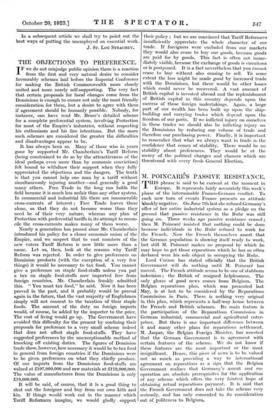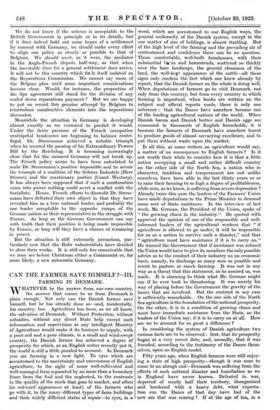M. POINCARS PASSIVE RESISTANCE.
THISphrase is said to be current at the moment in Europe. It represents fairly accurately this week's phase of the interminable Franco-German conflict. To each new turn of events France presents an attitude blankly negative. On June 7th last she refused Germany's Offer of her entire industrial system as a pledge on the ground that passive resistance in the Ruhr was still going on. Three weeks ago passive resistance ceased ; then M. Poincare insisted that nothing could be done because individuals in the Ruhr refused to work for the French. Now the French themselves assert that the German population is showing itself ready to work, but still M. Poincare makes no proposal by which he may hope to get those reparations which he has so often declared were his sole object in occupying the Ruhr.
Lord Curzon has stated officially that the British Government will do nothing until M. Poincare has moved. The French attitude seems to be one of stubborn indecision ; the British of resigned helplessness. The only gleam of good news comes from Belgium. The Belgian reparations plan, which was presented last May, is at last to be considered by the Reparations Commission in Paris. There is nothing very original in this plan, which represents a half-way house between the French and British schemes. Its main feature is the participation of the Reparations Commission in German industrial, commercial and agricultural enter- prises. But there is one important difference between it and many other plans for reparations settlement.
M. Jaspar, the Belgian Foreign Minister, has asserted that the German Government is in agreement with certain features of the scheme. We do not know if these features are the most important or the most insignificant. Hence, this piece of news is to be valued not so much as providing a way to international agreement on reparations as a sign that the Belgian Government realizes that Germany's assent and co- operation are absolute prerequisites for the application of any scheme which offers the very faintest hope of obtaining actual reparations payment. It is said that the French Government does not take the scheme very seriously, and has only consented to its consideration out of politeness to Belgium. We do not know if the scheme is acceptable to the British Government in principle or in its details, but if it does indeed hold out some hopes of a settlement by consent with Germany, we should make every effort to align our policy as closely as possible to that of Belgium. We should meet, as it were, the mediator in the Anglo-French dispute half-way, so that when the inevitable time for a general settlement does arrive, it will not be this country which fin is itself isolated on the Reparations Commission. We cannot say more of the Belgian plan until some important considerations become clear. Would, for instance, the proportion of the Spa agreement still stand for the division of any scaled down reparations payment ? But we are happy to put on record this genuine attempt by Belgium to reintroduce constructive elements into the reparations discussion.
Meanwhile the situation in Germany is developing almost exactly as we ventured to predict it would. Under the fierce pressure of the French occupation centripetal tendencies are beginning to balance centri- fugal. Dr. Stresemann achieved a notable triumph when he secured the passing of his Extraordinary Powers Bill by the Reichstag. It is becoming increasingly clear that for the moment Germany will not break up. The French policy seems to have been calculated to make Dr. Stresemann's position impossible and to secure the triumph of a coalition of. the Schwer Industrie (Herr Stinnes) and the reactionary parties (Count Westarp). It has always been supposed that if such a combination came into power nothing could avert a conflict with the Socialists. Hence, French efforts to discredit Dr. Strese- mann have defeated their own object in that they have revealed him as a true national leader, and probably the one leader acceptable to the opposite camps of the German nation as their representative in the struggle with France. As long as the German Government can say with truth that their position is being made impossible by France, so long will they have a chance of remaining in power.
But the situation is still extremely precarious, par- ticularly now that the Ruhr industrialists have decided to close their works. It is still only too conceivable that we may see before Christmas either a Communist or, far more likely, a new autocratic Germany.











































 Previous page
Previous page